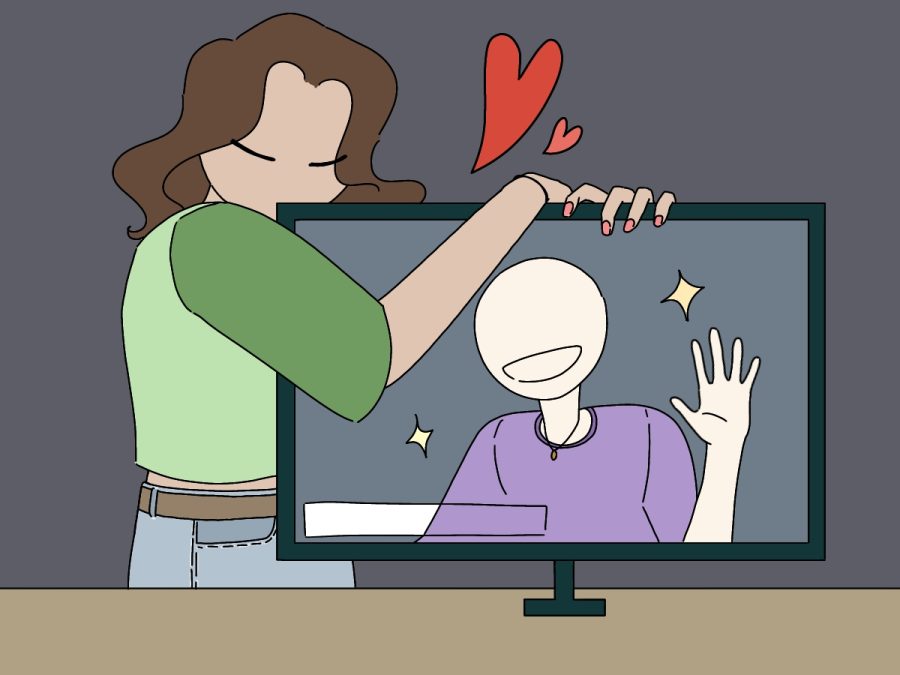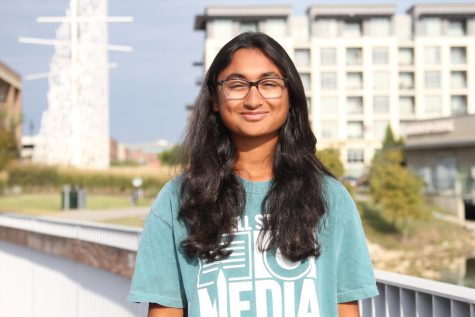Celebrities are not your friends
With the growing use of social media by celebrities allowing fans to see into their lives, there has been an increase of parasocial relationships in teenagers. The Sidekick staff writer Saniya Koppikar thinks fans shouldn’t expect anything more from celebrities than what they display to the public.
April 8, 2022
The screen lights up blue in the darkness of the room, excitement flaring as the notification pings red announcing a midnight music drop.
Sleep doesn’t matter tonight, right?
After hours upon hours of scrolling through an influencer’s social media feeds, their favorite coffee shop and go-to order, their interviews and their daily happenings supersede the knowledge needed for tomorrow’s quiz.
Under their desk, a student has Ticketmaster pulled up as they take a test. They’re not going to miss the elusive chance to see their favorite artist, their idol, in person.
A shocking moment on the Oscars ignites online psychoanalysis, hundreds and thousands of Twitter reactions proclaiming disappointment and personal victimization.
In a seemingly tame beginning to a Grammy performance, a member of the most successful boy band in the world whispers in the ear of a shot-to-stardom young woman. Online, she faces ridicule and threats for ‘stealing’ him from his adoring fanbase.
As social media thins the boundary between public and private lives, attachment to celebrities can quickly spiral out of control. Despite having never met a certain actor, singer or comedian, and despite the fact that celebrities’ online personas are carefully curated, the ability to view aspects of their personal lives makes people expect they are entitled to more.
These are what are referred to as parasocial relationships, where only one side invests a personal stake in the other. It is a phenomenon whose occurrence has only risen as social media gives fans more access to celebrities’ lives, enabling fans the impression of mutual friendship.
Danger surges, however, when expectations begin to surpass the boundaries of celebrities.
Though it is common advice to not say things online that you wouldn’t say to a person’s face, somehow, celebrities are removed from this rule. Once a person receives a certain amount of fame, society seems to dehumanize them and deprive them of their basic rights to respect.
Take, for example, celebrity relationships. They are some of the most covered topics in popular culture simply because so much can be said on so little factual evidence, but speculation that seems harmless can be unexpectedly far-reaching.
Four days after the release of Taylor Swift’s re-recorded album Red (Taylor’s Version) last November, fans reignited decade-old hate towards singer John Mayer. Mayer is suspected to be the subject of songs on Swift’s album Speak Now, whose rerecording was especially anticipated after Red (Taylor’s Version) was released.
After a deluge of hate comments on his Instagram, Mayer chose one of the many death threats to reply to, writing “Do you really hope that I die?”
The writer of the message immediately backtracked, apologizing that she did not think Mayer would actually see the message or reply. While Mayer seemed to brush off the situation, wishing the writer to “go forth and live happy and healthy,” it cannot be ignored how widespread the perception of the untouchability of celebrities reaches.
It is exactly for this reason that many celebrities elect not to maintain their own social media presence, or maintain one at all. When faced with an unmeasurably large space to express any opinion one might have, the insulting treatment celebrities often face online indicates that many do not think of celebrities as people who can be affected by their words.
Combined with cancel culture, parasocial relationships create an increasingly volatile existence for those in the public eye, who are often forced to conform to their established image for fear of a sudden and career-ending shift of public opinion.
Following a celebrity, whether for the purposes of support or disapproval, does not entitle one their attention. Thinking so is incredibly damaging to the mental health of both parties. Not only does it create discomfort and danger for celebrities, but it also leads to an unhealthy dependence on a relationship that by its very nature is unsupported.
While parasocial relationships do not always evolve into celebrity worship syndrome, which can wreak much greater amounts of havoc on one’s mental health, the time and energy a person spends following a celebrity often lessens the amount of time spent with their real life friends and family. Looking at the usefulness of the two types of relationships, it seems obvious that placing a personal stake in celebrities is not beneficial.
Even as the significance of the typical large personality “influencer” declined in favor of smaller creators during the pandemic, many teenagers increased the amount of time they spent following celebrities in order to cope with isolation and loneliness. As a result, many celebrities still boast a huge following and an even stronger fanbase that places their trust and affection into a person who likely does not know they exist.
It is not reasonable to hold celebrities to impossible standards, and placing them on pedestals is not only harmful, but it also contributes to severe violations of privacy. Celebrities do not owe their fans anything simply because they are in the limelight. While they have certain moral responsibilities as the holders of so much influence over large parts of the population, it is unfair to treat them like a friend or peer with an established relationship.
Celebrities are not our friends. It is time to stop expecting them to act like they are.
Follow Saniya (@SaniyaKoppikar) and @CHSCampusNews on Twitter.












